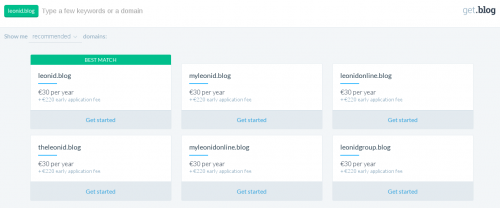Month: October 2016
Easier AWS CLI with Docker
Here is a handy blog post that shows how to simplify the installation and running of the Amazon AWS command line commands, using Docker. With the Dockerfile like this:
FROM python:2.7 ENV AWS_DEFAULT_REGION='[your region]' ENV AWS_ACCESS_KEY_ID='[your access key id]' ENV AWS_SECRET_ACCESS_KEY='[your secret]' RUN pip install awscli CMD /bin/bash
One can build the image and run the container as follows:
$ docker build -t gnschenker/awscli $ docker push gnschenker/awscli:latest $ docker run -it --rm -e AWS_DEFAULT_REGION='[your region]' -e AWS_ACCESS_KEY_ID='[your access ID]' -e AWS_SECRET_ACCESS_KEY='[your access key]' gnschenker/awscli:latest
Obviously, DO NOT hardcode your Amazon AWS credentials into an image, which will be publicly available through DockerHub.
Once the AWS CLI works for you, you can add the command to your bash aliases, to make things even easier.
GPL : Matt Mullenweg and Automattic vs. Wix
The General Public License (GPL) has been the source of many discussions since it was created in 1989 (with a few versions in following years) and applied to numerous Open Source Software projects.
Currently, there is one more such discussion going on. It was kicked off by Matt Mullenweg, the founder and CEO of Automattic, the company behind WordPress:
Anyone who knows me knows that I like to try new things — phones, gadgets, apps. Last week I downloaded the new Wix (closed, proprietary, non-open-sourced, non-GPL) mobile app. I’m always interested to see how others tackle the challenge of building and editing websites from a mobile device.
I started playing around with the editor, and felt… déjà vu. It was familiar. Like I had used it before.
Turns out I had. Because it’s WordPress.
He proceeds with the open letter to Wix:
Dear Wix,
This explicitly contravenes the GPL, which requires attribution and a corresponding GPL license on whatever you release publicly built on top of GPL code. The GPL is what has allowed WordPress to flourish, and that let us create this code. Your app’s editor is built with stolen code, so your whole app is now in violation of the license.
What does Matt want Wix to do? Very simple:
Release your app under the GPL, and put the source code for your app up on GitHub so that we can all build on it, improve it, and learn from it.
Did Wix respond? Yes, they did. First, one of their lead engineers, Tal Kol, wrote this blog post. I think it’s quite sensible and boils down to a misunderstanding. Or so I read it:
I apologize if I appeared to take credit for somebody else’s work. This was definitely not my intention. I think you guys are doing a great job.
Second one though is a bit less so, written by Wix CEO Avishai Abrahami. While trying to appear friendly and casual, it does dodge the whole issue of the GPL violation, misrepresents the facts on the branding, and ends with an awkward invitation for a coffee. WP Garage has a good summary of why this response is weak.
Here are a few more resources with commentary that help to understand the issue:
Personally, I am a big fan of GPL, Automattic, WordPress and Matt Mullenweg, who I had the opportunity to meet and talk to back a few years ago. But as a CTO of a startup (and not for the first time), I have to admit that Open Source Software is difficult when it comes to business. It requires a huge effort to make a company understand what Open Source Software is, what are the intricacies of the major licenses, and what are the consequences of using Open Source Software for different kinds of projects (internal tools, client projects, company products and services, etc).
Here are the important points that I want to highlight in regards to this conversion:
- If you are using Open Source Software, make sure you understand the licensing and the culture behind it.
- If you made a mistake, admit to it and figure out a way to resolve it. Dodging or finger-pointing is not a resolve.
- Legal action is not the only option. Often, it is not even the most preferable.
- Be nice to people. :)
I’d like to finish with this tweet, which I think highlights the most important point.
https://twitter.com/pt/status/792431953601449984
P.S.: Some people say that GPL has not been enforced in courts. This page lists a few cases in several countries, which provide examples of the contrary.
base32 advantages over base64
Andrey shares some of the advantages of base32 over base64 encoding:
- The resulting character set is all one case, which can often be beneficial when using a case-insensitive filesystem, spoken language, or human memory.
- The result can be used as a file name because it can not possibly contain the ‘/’ symbol, which is the Unix path separator.
- The alphabet can be selected to avoid similar-looking pairs of different symbols, so the strings can be accurately transcribed by hand. (For example, the RFC 4648 symbol set omits the digits for one, eight and zero, since they could be confused with the letters ‘I’, ‘B’, and ‘O’.)
- A result excluding padding can be included in a URL without encoding any characters.
Personally, I don’t think I’ve heard about base32 until today.
Automattic and .blog domains
I was very excited when six years ago Automattic, the company behind WordPress, became a domain registrar. Registering, renewing, and managing domains is still a painful process today as much as it was six years ago.
So, what have the company decided to do with its new super power? Well, they’ve integrated domain registration with their WordPress.com hosted blogging service. And now they are promoting the new .blog domains:
Millions of short, easy to remember domains will be available when the .blog domain goes live November 21. Apply now to secure the perfect domain for your blog.
This sounds cool, until you check the prices.
30 EUR per year is not cheap. But an additional 220 EUR early application fee on top of it makes it a no deal for me. I wonder how many bloggers out there will go for this.
I understand that managing a top level domain is not an easy thing to do. Everything from infrastructure to technical support costs money. But at those prices, I think I’ll wait until the technology gets cheaper. Because it inevitably will.

